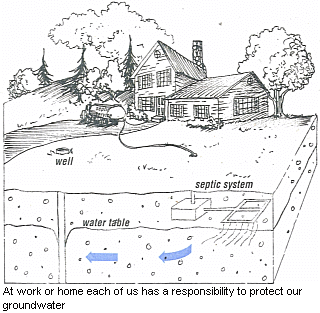Management
Words of wisdom from the League of Women Voters: “ Water pollution is not so much a water problem as it is a people problem.” Yet, many people and businesses maintain there’s nothing they can do to prevent water pollution; only federal, state, and local governments can cope with the problem. Although Connecticut residents can be proud of the state programs established to protect our water supplies, several of which are judged national models; responsible individual action also is necessary to keep water safe.
The following is a recommended combination of public and private approaches.
- Limit the risk of chemical leakage or spillage, adopt local standards governing the manufacturing, storage, use, handling and disposal of hazardous materials. These might be zoning regulations or town ordinances that stipulate performance standards for defined high–risk activities.
- Local zoning regulations can designate special water supply protection areas where high-risk land uses, such as gas stations, cannot be sited but lower-risk commercial enterprise can be. Ideally, the most critical water supply source areas should be maintained as open space.
- Use nonregulatory ways to help protect groundwater. Mount a public education campaign on groundwater risks, how a properly handle and dispose of chemicals, how to acquire, by purchase or bequest, a critical well recharge area. Conduct regular household hazardous materials collection days.
- Inform folks on how to properly use and maintain septic systems, advising them that these need to be routinely pumped. Ensure that both commercial and residential oil storage tanks are maintained.
- Encourage the sensible use, storage and disposal of commercial and residential pesticides and fertilizers. All of us can help protect groundwater by reducing use of these products
- Monitor important well areas, and test wells periodically.

